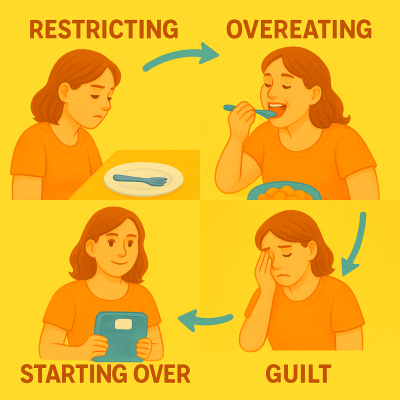
Weight
Loss
Redefining the Weight Loss Journey
Let’s be honest — weight loss can feel like a never-ending battle. You’re surrounded by food, overwhelmed by fad diets, and worn down by unsustainable exercise plans. You try to eat “right,” avoid sugar, join the latest program… and still, nothing sticks. The cycle of guilt and frustration repeats.
That’s where hypnosis can help.
Unlike diets and workout trends that focus only on what you eat or how you move, hypnosis addresses the unconscious thoughts and emotional triggers that sabotage your success. It helps you shift your mindset — so you naturally make healthier choices, without relying on sheer willpower.
Whether you struggle with emotional eating, stress cravings, or simply staying motivated, our goal at Hoosier Hypnosis is to help you retrain your mind — not restrict your body. Together, we target the root of the habit, not just the symptom.
The Body and the Mind
Your body and brain are deeply connected. When you’ve tried diet pills, extreme plans, or rigid calorie counting without results, it’s not because you’re weak — it’s because those plans ignore the emotional and behavioral drivers of eating.
We often turn to food not out of hunger, but out of habit, emotion, or boredom. You may associate eating with comfort, socializing, or reward. You might unconsciously snack to deal with anxiety, stress, or depression. These patterns are rarely addressed in traditional plans — but they’re central to lasting change.
Hypnosis helps by bypassing your conscious resistance and working directly with the unconscious mind, where habits are formed and sustained. It helps you release the cycle of:

Why Is Weight Loss So Hard?
You’re not alone. Most people struggle with weight loss for reasons beyond food itself. Here are a few of the most common:
-
Food as comfort: We learn to self-soothe with snacks, sweets, and meals.
-
Portion blindness: It’s easy to eat more than we realize, especially when distracted.
-
All-or-nothing diets: Restrictive plans increase cravings and emotional pressure.
-
Sleep, stress, and mood: Poor sleep or high stress elevates cortisol and hunger hormones like ghrelin, making it harder to resist temptation.
-
Nutritional imbalance: A diet low in nutrients can increase hunger and decrease energy.
Hypnosis helps by reducing cravings, reframing emotional responses, and reinforcing healthy choices at a deeper level.
Processed Foods and Sugar: More Than a Willpower Issue
Processed foods are everywhere — and they’re engineered to hijack your brain’s reward system. These products are high in added sugars, salt, and synthetic additives that make them hyper-palatable and habit-forming.
According to the National Institute of Health, over 70% of packaged foods in the U.S. contain added sugars. These sugars have been linked to:
-
Obesity and metabolic syndrome
-
Cardiovascular disease
-
Type 2 diabetes
-
Cognitive decline and dementia
-
Mood disorders like depression and anxiety
Sugar is also now considered an addictive substance, triggering dopamine releases in the brain similar to those of cocaine or alcohol (Lenoir et al., 2007). That’s why it’s not just a matter of discipline — it’s about retraining the brain.
Food labels are often misleading these days, containing harmless-sounding items that are, in actuality, toxic to the body. These may act as preservatives, colorants, textural components, or flavor additives. These “foods,” if one can call them that, are often full of sugar (and other additives) with very little nutritional benefit. In addition, food manufacturers spend massive amounts of resources on making their foods as “rewarding” as possible to the brain, which leads to over-consumption.
Our bodies are designed to seek out sugar and fat. Foods that were once scarce are being made as accessible to the brain, which can lead to significant amounts of resources being made in our diet. The truth is that evolution hasn’t caught up. All of these new man-made chemicals trick our bodies into thinking that it’s getting what it needs. It often requires more nutrients and vitamins. Our poor diet, more particularly sugar, has even been linked to declines in child intelligence, Alzheimer’s, and Cancer.
Hypnosis helps interrupt this addictive loop by addressing not just behavior, but the emotional attachment and mental pattern behind it.

Signs Your Eating Habits May Need Support
If any of these sound familiar, you’re not alone — and help is available:
-
You eat when stressed, bored, or overwhelmed
-
You feel out of control around certain foods
-
You regularly overeat, then feel guilty afterward
-
Your eating habits are affecting your self-esteem, health, or relationships
-
You try to change but find yourself reverting to old patterns
These challenges are common — and they are not a personal failure. They’re habits learned over time, and like all habits, they can be unlearned.
Worse yet, we are finding out now that sugar is a highly addictive substance with its slew of health issues associated with it. If you read a food label, you’ll realize that the fewer processed foods you eat, the less of these chemicals you are ingesting.
Many addiction treatment centers are now offering services. Many of us rely on sugar to help deal with emotions or struggles in our lives. It is a familiar story that many, if not all of us, have heard. Sugar in moderation is not harmful. It is very hard not to overdo it, though. Many of us eat entirely too much sugar. In fact, it is estimated that at least 75% of Americans eat excess amounts of sugar. Among those, many could be classified as having a sugar addiction. The concept is so new that we don’t even really know how many people are affected by sugar addiction.
We know why this happens, though. Sugar consumption triggers a short-term surge in energy. It has been suggested that sugar is as addictive as cocaine. It releases dopamine into the system, and while that may feel nice, it comes with a wide variety of health risks. In particular, it is an additional risk for people with depression, anxiety, stress, and pain.
For More information, check here.
Sugar Related Diseases
How Hypnosis Helps
At Hoosier Hypnosis, your experience is always personalized. We start by understanding your patterns:
-
What emotions trigger eating?
-
When did these habits begin?
-
What’s currently standing in your way?
From there, we guide you into a relaxed, focused state of awareness where your mind becomes more receptive to positive, goal-aligned suggestions. You’ll work through interventions designed to:
-
Replace “all-or-nothing” thinking with realistic self-talk
-
Weaken cravings and emotional triggers
-
Reinforce motivation and self-worth
-
Build habits aligned with your long-term health

A Whole-Body Approach
While hypnosis addresses the mental and emotional side of weight loss, physical health matters too. We encourage clients to consult with a registered dietitian or physician when needed. If you’re unsure where to start, we’re happy to help you explore whether hypnosis, nutritional guidance, or a combination of both is right for you.
You may also find support in related services like:
Our goal isn’t to “control” you — it’s to help you take back control of your choices, your health, and your future.
If you have questions check out our FAQ
References
-
Lenoir, M., Serre, F., Cantin, L., & Ahmed, S. H. (2007). Intense Sweetness Surpasses Cocaine Reward. PLoS ONE, 2(8), e698.
-
National Institutes of Health. (2018). Added Sugar Intake and Health Outcomes.
-
Jacka, F. N., et al. (2010). Association of Western Diet With Depression and Anxiety. Psychosomatic Medicine, 72(6), 456–462.
